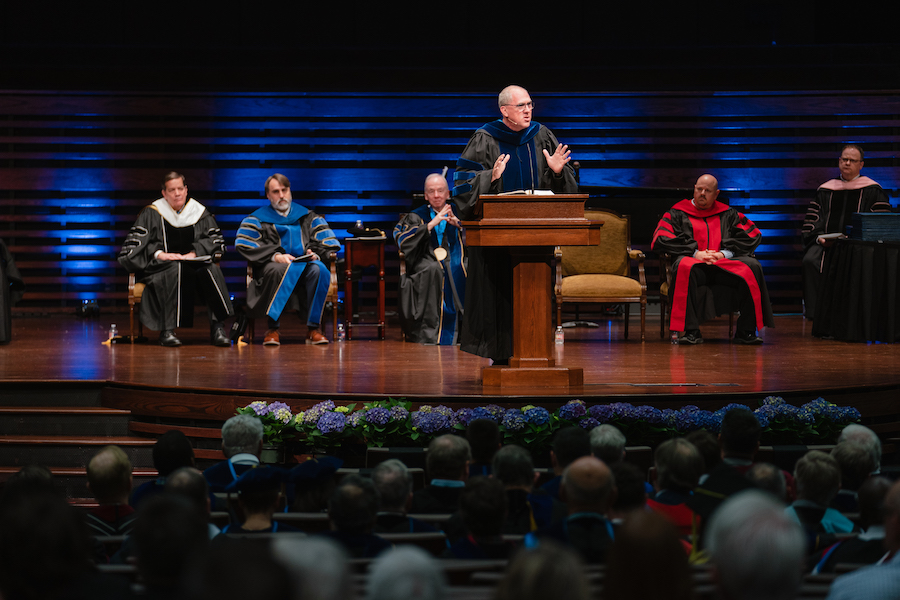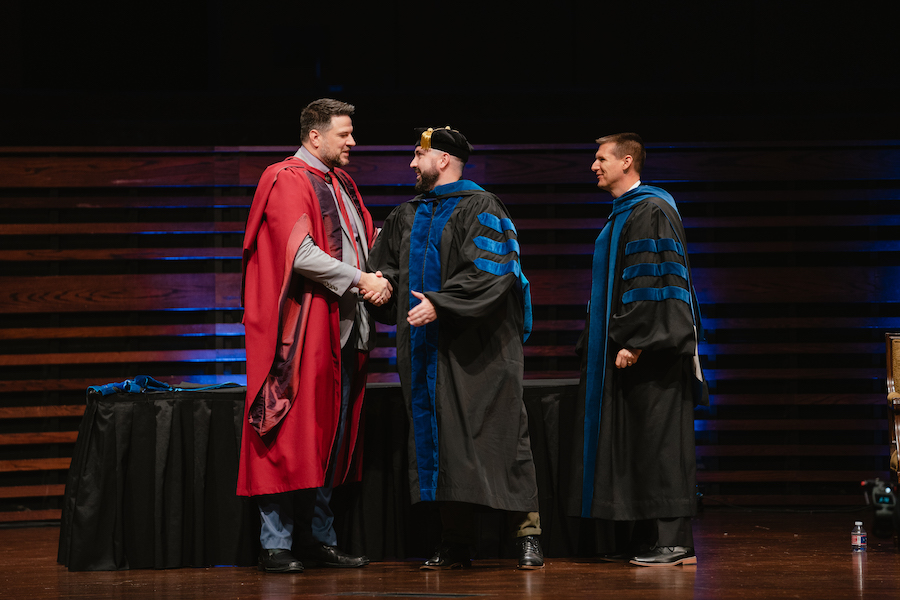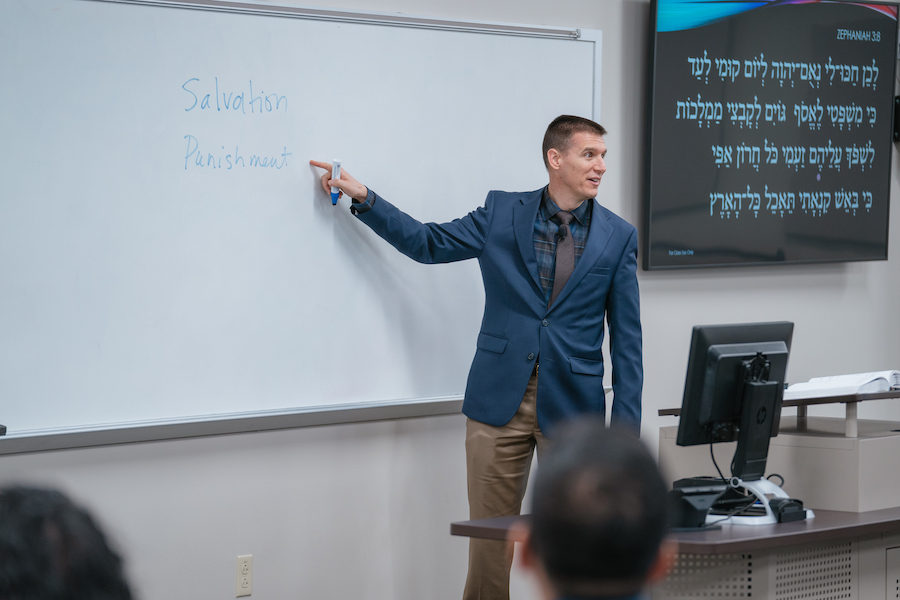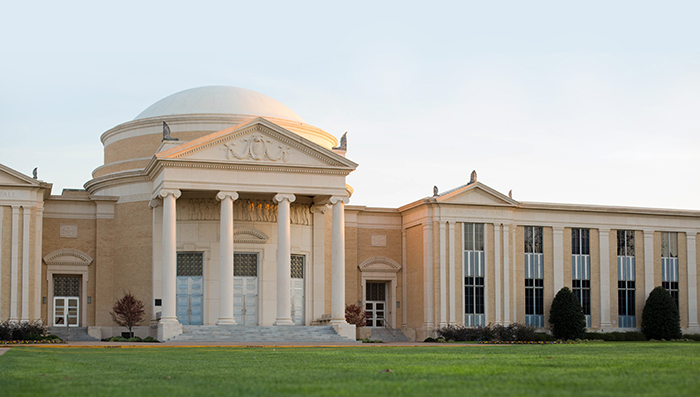FEATURE: The job title Buckner CEO Albert Reyes wants is ‘servant’
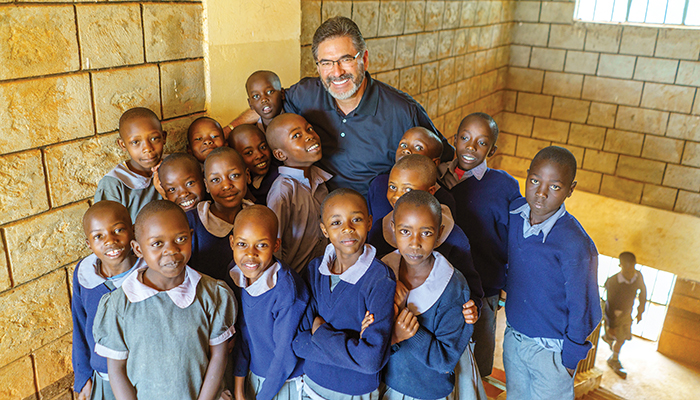
Editor’s Note: The following feature story originally appeared in the fall 2019 issue of Southwestern News (pg. 32-37).
More than 150 million children around the world live as orphans. The number of people over the age of 65 in the United States is increasing by the day. And global migration is greatly impacting the strength and integrity of families, especially in North, Central, and South America. These demographics—these people—represent the “least of these” whom Jesus identifies in Matthew 25. For Albert Reyes, ministry to them is crucial. To this ministry God has called him. And as it has been for all of his life, Reyes’ answer is “yes.”
The child of a former U.S. Marine, Reyes never waited for his father to call him twice. Whenever his dad called Reyes’ name, he always answered, “Yes, sir.” If the command was “Jump,” Reyes answered, “How high?”
Reyes’ commitment to obedience applied not only to his earthly father, but to his heavenly One, as well. So when Reyes sensed God’s call to ministry, there was no question about how he would answer.
Reyes recalls that his father cautioned him about the trials he would face as a minister. But even so, he said with confidence, “I believe the Lord is calling me to ministry. I’m not sure exactly what to do.… I just want to serve.”
Reyes was 15 years old then. Nearly 45 years later, he is still on that same path of obedient response to the Lord. Filling a number of ministry roles over the years, up to and including president of Buckner International—a Dallas-based ministry serving seniors, children, and families—Reyes has maintained a long habit of obeying and saying “yes,” striving to be nothing more than a servant of the Lord.
“I’ve tried to let that belief drive everything I do—that I’m just a servant,” he says. “No matter what position or title you put on me, the one that I want is ‘servant.’”
Following his call to ministry, Reyes earned a bachelor’s degree from Angelo State University, then began training for ministry at The Southwestern Baptist Theological Seminary. He studied toward a Master of Divinity degree, and due to pastoring a church at the time, he “crammed” the three-year program into six years, graduating in 1989. He later completed a Doctor of Ministry (D.Min.) in 1995.
Reyes says his education at Southwestern Seminary, particularly in the basic disciplines of preaching, pastoral care, and theology, shaped him to be a servant leader.
“Theology breeds methodology, so what you believe is what you do, so I think it’s critical to get straight what you believe,” Reyes says. “And I believe that Southwestern really gave me a strong foundation in theology and biblical foundations. It’s rock solid.”
Reyes put this training to use first as a pastor and later as a chaplain for the U.S. Army. He then planted a church in El Paso and led it for seven years.
During this time, the field supervisor for Reyes’ D.Min. studies, Levi Price, requested his resume.
“I didn’t ask him what he wanted it for,” Reyes recalls, “I just said ‘yes.’”
It turned out that Price wanted to pass along Reyes’ resume to the Hispanic Baptist Theological Seminary in San Antonio. The presidential search committee subsequently contacted Reyes about filling the position, and after a prayer-filled interview process, Reyes was appointed the institution’s president.
Reyes helped the institution get accredited and certified as a degree-granting institution, expanded the campus, and changed its name to the Baptist University of the Americas (BUA). “The Lord just really blessed and favored the work there,” he says.
Despite thinking he would remain there indefinitely, Reyes eventually received a call from Buckner International about succeeding then-president Ken Hall, who planned to retire within the next few years. Though initially reluctant to do so, Reyes determined through prayer and a purposeful sensitivity to the leading of the Holy Spirit that this was, indeed, the right move.
“I learned to hold things loosely,” Reyes says. “It’s not me. I’m not in control. I’m not the master. I’m still just a servant.”
Reyes joined Buckner International in 2007 as president of Children and Family Services, and within the next five years, he became president and CEO of the whole organization. As the sixth president of Buckner since its founding in 1879, Reyes’ aim has been to shape and focus the organization’s services and reach.
“I think my contribution to this long ministry is to focus our attention on narrowing our service offerings, going deep in places we already exist, and then taking our assignment up for impact in the Americas,” he says.
Under his leadership, Buckner has focused on four primary service offerings. The first is senior care, which includes retirement communities for independent living, assisted living, skilled nursing, and memory care.
Reyes’ Hebrew and Greek professors at Southwestern Seminary—Harry Hunt and Lorin Cranford, respectively—currently reside in these communities. “So both of my language professors, we’re taking care of them,” Reyes says. “Great, great serendipity.”
The second is foster care and adoption, placing children in safe homes with loving families.
“The state of Texas contracts with Buckner to provide healthy family environments,” Reyes explains. “Since we’re a Christ-centered organization and faith-based, we tend to attract the kind of parents who also have faith similar to ours, and our values are consistent. We know that we’re putting a child in a family that really values our values and comes from a biblical, theological perspective as well, to offer a caring environment.”
Third is a family preservation program called Family Pathways. Through this service, single parents can live in a Buckner community—with their children—and earn an Associate of Arts degree at a local community college, as well as life skills through counseling, coaching, and spiritual development.
Finally, Family Hope Centers seek to keep families together by providing them with critical services, aid, and coaching to keep them strong and decrease the likelihood of abuse, neglect, and removal of children.
“People come, and we meet their needs,” Reyes says of the pattern in these centers. “They want to study the Scripture. They get into Bible study groups, then they get saved. And then, before you know it, they’re asking if they can worship. They outgrow the worship places. We’ve seen churches that have been started because of that.”
Reyes believes that by narrowing Buckner’s focus to these four areas, he is continuing his habit of saying “yes” to the Lord.
“I think that leaders throughout the Scripture don’t ask for certain assignments, they don’t create the dilemmas, they don’t walk into environments that they shaped,” he explains. “They’re summoned to lead. … Every leader does the best he or she can do with the circumstances that they have and the opportunities that they have.”
Reyes’ “circumstances” include 153 million orphans worldwide, roughly 50 million senior citizens in the U.S., and nearly 300 million global migrants. Fortunately, each of these circumstances is accompanied by an opportunity for ministry, and combining his training at Southwestern Seminary with the resources of Buckner International, Reyes is able to minister “unto the least of these” spiritually and physically, even if not in the traditional order.
“My training and expertise is church planting and missions and evangelism,” Reyes explains. “That was my D.Min. study, so I haven’t lost that passion, but the way we do it is sort of in the reverse order. Instead of gathering people and announcing the Gospel, leading them to Christ, discipling them, equipping them so they can do ministry, we do ministry first. We have volunteers and staff go in and do ministry and give a cup of cold water in the name of Jesus to minister to the least of these; to go to their hurting families and shine hope in their lives with the incarnational presence of the Gospel by showing up.”
“Once we do that,” he continues, “we have plenty of opportunity to tell the reason for our faith. They have a hunger. We take care of the other needs; the spiritual needs still need to be met. Part of my imprint on Buckner is to sort of revive what’s always been there—the redemptive work of Christ. Whatever was intended for harm, God intends it for good. We’re the agents of His redemptive work. … We know that the Good News to the poor is not just physical; it’s spiritual, too.”
One example of this stems from a Buckner service called “Buckner Shoes for Orphan Souls,” which has collected four million pairs of shoes to distribute to orphans and vulnerable children around the world. Several years ago, the three millionth pair of shoes was given to a girl in Guatemala named Dulce.
Reyes, some Buckner team members, and several donors visited Dulce’s family in their village outside Antigua, Guatemala. The house consisted of a wood frame, tin roof, and dirt floor. “Very meager,” Reyes says.
When they arrived, Dulce’s father was intoxicated, but her mother invited them in nonetheless, requesting prayer. Reyes recalls her three requests.
First, she said, “Would you pray I will not give up learning how to read in Spanish? Because I don’t know how to read. I’m learning how to read, but it’s very hard to stick with it, because my life dream—my greatest aspiration—is to someday read the Scripture for myself.”
The woman’s earnestness and spiritual hunger “knocked the wind” out of Reyes. “I don’t know that I’ve ever been that desperate to read the Scripture in a long time,” he thought, tears suddenly pouring from his eyes.
The woman continued, sharing that they had been evicted from their home and needed prayer for their living situation. Finally, she said, “My husband is a good man, and I love him, but he’s sick.”
She was referring to his alcohol abuse. “I just don’t know what else I can do. So maybe if you pray that something can happen.”
Reyes regained his composure, and the group assembled in the home joined hands in prayer.
The next day, the local judge ordered Dulce’s father out of the house, charging that he go either to jail or to rehab. Members of the local church gathered around him and encouraged him to choose rehab, assuring him they would go with him, pray with him, and support him.
He followed their advice, and in the weeks that followed, Dulce’s father stopped drinking alcohol. Furthermore, due to the witness of those local church members, he gave his life to Christ.
Meanwhile, the donors who had accompanied Reyes to Dulce’s home had rallied together and raised funds to build Dulce’s family a new house. They held a ribbon-cutting for the newly constructed home at the same time that Dulce’s father got baptized as a public profession of his faith.
“We knew that we could get them a new house, but we didn’t expect to get them a new dad,” Reyes says. “That’s what the power of the Gospel does. … Still, they have prayer concerns and issues, but to see the life transformation and the power of the Gospel, it’s amazing.”
“That’s why I love what I do,” Reyes says, “because I get to blend social ministry—real solutions to real problems that everyday people face—with the hope of the Gospel message. They go together.”
A lifetime of saying “yes” to the Lord has led Reyes to opportunities such as these. Summoned to lead Buckner International as an agent of God’s redemptive work, Reyes has done the best he can do with the circumstances he has, and as a servant of the Lord of lords, his ministry has been blessed by God to the benefit of many around the world.
